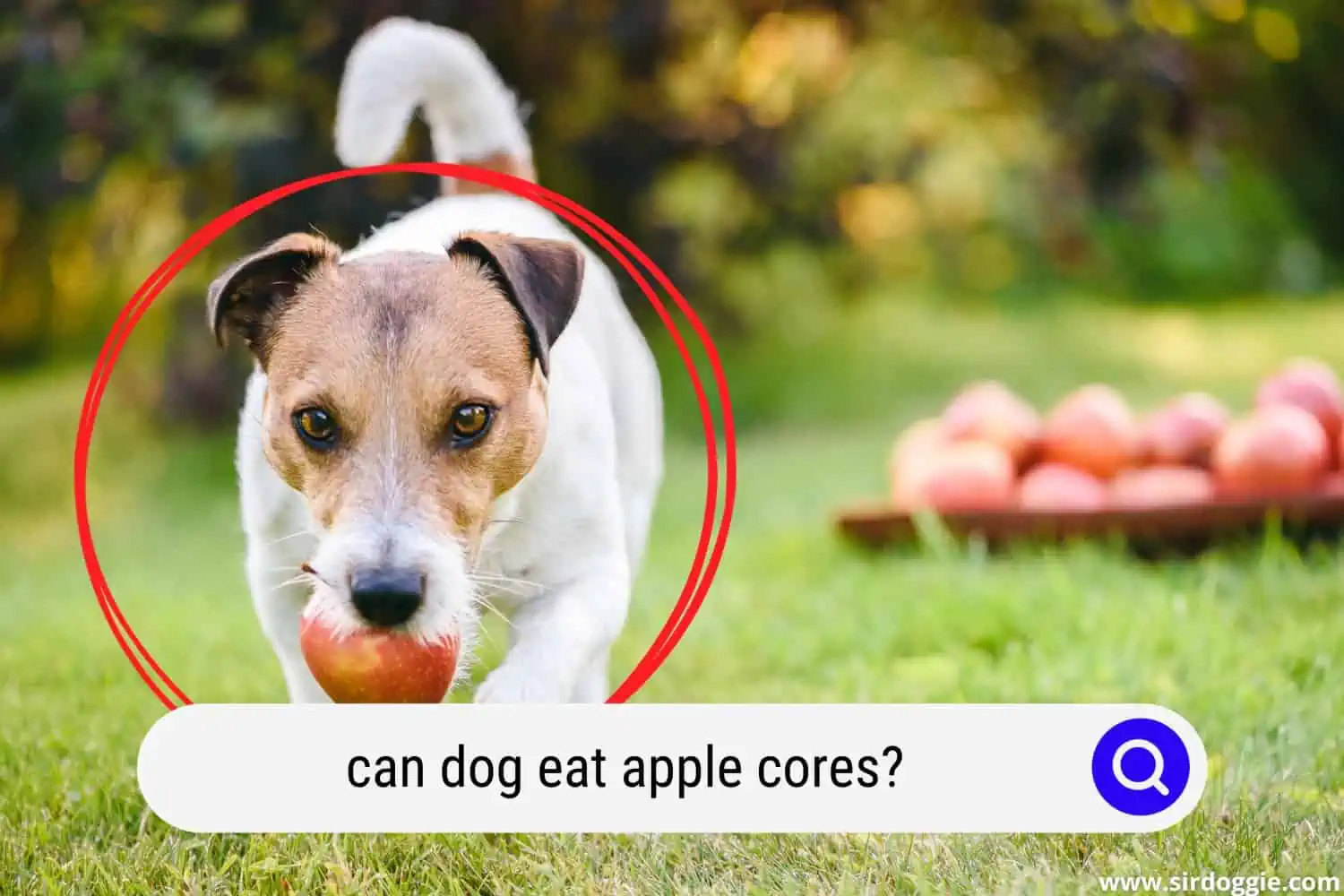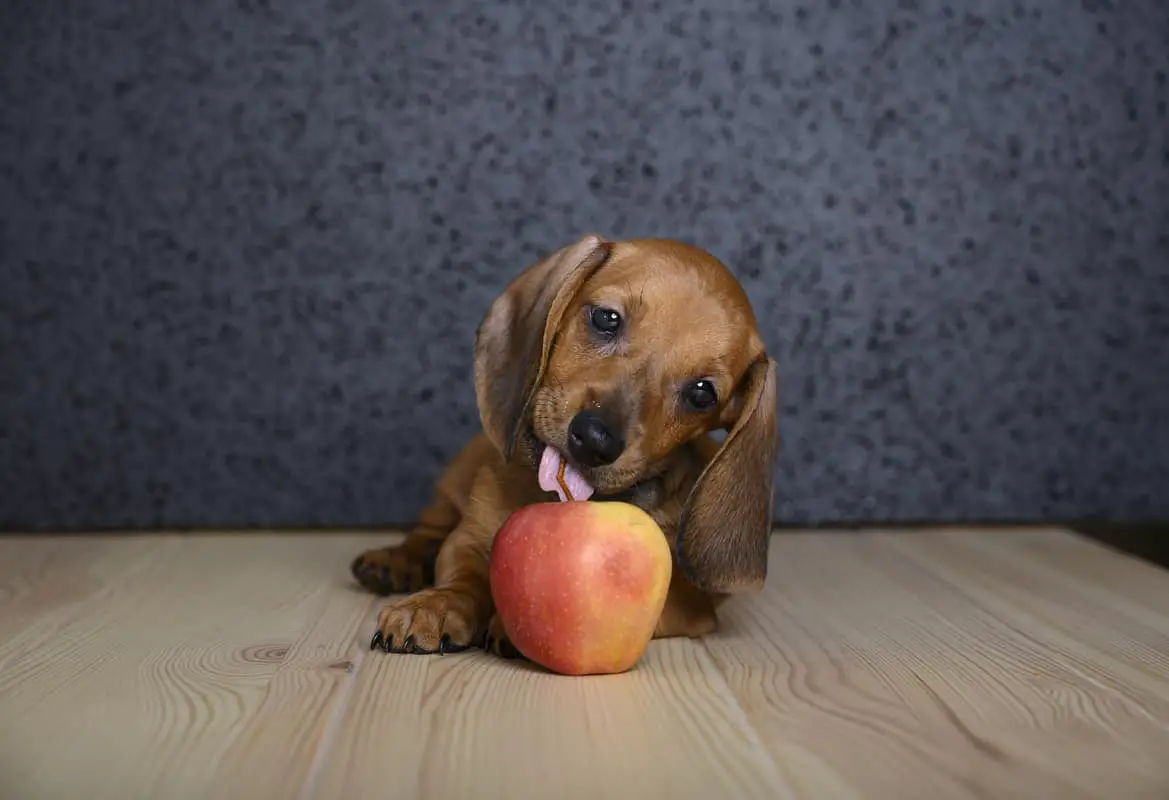Can Dogs Eat Apple Cores? Are They Safe?
As a dog parent, you must be concerned about your dog’s health. This requires keeping a tight check on what is going on in their tummy.

Apples are loved by everyone and your dog will not lag from munching this sweet fruit.
Many dogs tend to eat anything they get their paws on. When it comes to apple cores, you may have heard that they are toxic for dogs. But is that true?
Related Reading: Can Dogs Eat Tortillas?
What happens if a dog eats an apple core?
Well, the feeding of sensible amounts of apple cores to dogs is harmless. Apple core is an affordable and low-calorie snack but it is not a dog-friendly treat.
Here are some reasons why an apple core is not a suitable snack for dogs:
- The apple core is firm and difficult for most dogs to chew.
- Apple core can give choking hazards to your dog.
- Apple core contains seeds and a stem that provide no nutritional value to your dogs.
- Apple seeds contain a small amount of cyanide which is toxic and poisonous.
- Some dogs might be allergic to the cyanide in the apple seeds, or it may have adverse effects on their appetite.
If your pooch has eaten an apple core and doesn’t seem to be having any problem, there’s no reason to worry about it.
If your dog appears to be drowsy or showing signs of stomach upsets, you should take your dog immediately to the vet and get them checked.
Can an apple seed kill a dog?
Apple seeds are also not recommended for dogs because of their toxicity. They contain a cyanide compound, which is poisonous if chewed or ingested in large amounts.
Cyanide levels are extremely low and quickly metabolized.
The cyanide in apple seeds isn’t a danger after a single apple. A few apple seeds won’t kill your dog. Here is why eating a few seeds won’t harm your four-legged friend:
- An apple on average has only 5-10 tiny seeds.
- Your dog is most probably not going to eat a couple of apples at the same time.
- It is not like your dog is having apples for every meal, every day of the week.
Apple seeds have the potential to cause toxicity, but the fact is that the risk is extraordinarily small. The poison may accumulate over long periods of exposure. It’s better to pop the seeds out before treating your dog to savory apples.

Can dogs eat apple skin?
Apples are a healthy, nutritious, and tasty snack for dogs. Feeding your dog apple skin generally depends on the quantities and the individual dog in question.
If you’re feeding your dog a few slices of apple, the peel shouldn’t be a problem. However, a large amount of apple peel can cause dietary upsets.
Can a dog eat an entire apple?
If your pooch loves apples, it’s not a bad thing. Dogs can have apples. Apples are a safe and healthy treat that you can share with your dogs. They make a great snack for your furry friend.
Give apples to your dog in a moderate amount. A few slices of apple make a good serving for your dog. Apple should not exceed 10 percent of your dog’s daily calories.
Some of the benefits of having an apple in the dog’s diet are:
- They provide vitamin A, vitamin C, and dietary fiber
- Apples are a good source of calcium and phosphorus
- Apples contain immune-boosting antioxidants
- They are good for their dental hygiene and help to freshen their breath
- Apples are loaded with carbohydrates which is a great energy source for your dog
- They are a perfect snack for senior dogs as apples are low in protein and fat
How should you feed apples to your dog?
Here is how you should feed apples to your dog:
- Wash the apples because they may contain herbicides or pesticides
- Peel them and cut them into slices or chunks (depending on your dog’s taste buds). It’s easier for your dog to chew.
- For complete safety, take out the apple seeds and stems before serving them to your dog
- You can also give your dog apple juice
- You can prepare homemade applesauce and mix it with dog food
- You can prepare a tasty smoothie by blending apples with other healthy fruits
- Also, there are plenty of dog treat recipe that includes apple and you can prepare them at home
This will make apples a hundred percent safe and a good healthy snack for your dog.
Remember that too many apples can cause an upset stomach, even in healthy dogs. Some senior or sick dogs have medical conditions that may be worsened by consuming apples.
Pet Parent Tip: Apples should be an occasional treat for your dog alongside a well-balanced dog diet.
How many apple seeds will kill a dog?
Apple seeds if consumed in huge quantities by a dog can be toxic.
The number of seeds to be consumed to be toxically lethal is huge, almost a full cup.
If your dog’s average weight is 10 kg, they would need to eat around 1000 seeds to be poisoned. A standard apple contains about 5-10 seeds. This means you need to eat around 100 – 200 apples to have problems.
Foods that are toxic for dogs
As a responsible dog parent, it is important to know what foods are toxic for your furry friend. Dogs are primarily meat-eaters and thrive on nutrients provided by animal flesh and organ meat.
In fact, there are a lot of human foods that your pooch should never eat. They include:
- Chocolate and Caffeine
- Grapes and Raisins
- Alcohol and Raw Bread Dough
- Xylitol
- Onion
- Garlic
Furthermore, you should not feed your dog avocados, corn cobs, ice cream, lemons, mushrooms, nuts, or tomatoes. Artificial flavors, colors, and preservatives also have negative consequences on your dog’s health.
Pet Parent Tip: If you are unsure of a specific food that you can feed to your dog, always seek advice from your vet.

Final Thoughts
To keep your four-legged friend out of trouble, it is best to avoid feeding them apple cores regularly. Always feed them a diet that meets their nutritional needs.
We hope your dog stays happy and keeps wagging its tail. If you have any comments, please do let us know. We would be happy to hear from you.

Family Dog Expert Author
Hi there! I’m Stuart, a devoted dog lover and family dog expert with over a decade of experience working with our furry companions. My passion for dogs drives me to share my knowledge and expertise, helping families build strong, loving bonds with their four-legged friends. When I’m not writing for SirDoggie, you’ll find me hiking, playing with my beautiful dog, or studying music.